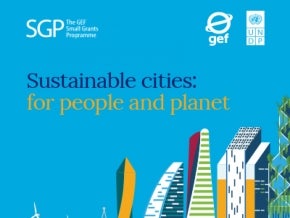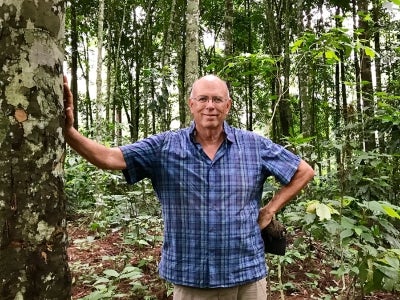Yi Liu has been the National Coordinator of the United Nations Development Programme (UNDP) administered GEF Small Grants Programme (SGP) in China since 2009. In an interview, she reflected on the ways the COVID-19 crisis has impacted efforts to help local communities address environmental challenges, and shared life lessons from her work.
What is the GEF Small Grants Programme and what does it aim to do?
SGP provides financial and technical support to non-governmental organizations (NGOs) and community-based organizations who are working to restore the environment while improving local livelihoods. We work across different GEF focal areas, including biodiversity, climate change, land degradation, international waters, and chemicals and waste.
Supporting NGOs and local communities is important as they often lack capacity, funds, and a seat at the table in natural resources management and environmental policy-making processes. Also, many local communities are situated close to forests, mountains, rivers, or grasslands, with livelihoods dependent on these natural resources. As such, they know best their environment and homeland and are important sources of traditional knowledge about ways to conserve and sustainably use nature's resources. Most SGP projects are in remote and marginalized areas. Through our work, local communities can be empowered to discuss the challenges they face. Through SGP’s support, many communities have conducted natural conservation activities, developed sustainable livelihoods, and most importantly, established long-term mechanisms for environmental protection through their community codes or village regulations.
What we are trying to do is help the local people and communities become stewards of natural resources and take ownership of environmental protection. I think the slogan "think globally, act locally" really illustrates the spirit of SGP.
Is there a person or community you have met through this work that had a lasting impact on you?
Yes, indeed. Lots of people and communities that I met during my time with SGP have impressed me and inspire my work. One summer, I visited one of our projects in the Qinghai-Tibet plateau. When we were driving to the project site, I was bewildered by the slow and erratic pace of the cars and trucks. Then, I saw Tibetan people sweeping something with brooms on the road. Later, the local project partner told me that during this season, a kind of little worm often comes out on the road and people drive slowly to avoid killing the worms. Local Tibetan people from different villages voluntarily come to collect the worms and bring them back to the grassland. For Tibetan people living there, whatever it is, a little worm or a snow leopard, a grass or a forest, all life is equally important. Even mountains and lakes are living things in their culture. It is the reverence for life and the respect for nature that make the local people have a unique culture of living in harmony with nature. Those Tibetan people led me to rethink the relation between humans and nature, our place on this planet, and the interconnectedness of life.

Other grantee partners that I have met also inspired me a lot. For example, a journalist who wrote news stories about environmental problems and then founded an environmental NGO to work at the frontlines instead; a young man who made great efforts to become the only university student from his village and after graduation chose to return to his village and help his community; and the many volunteers who contribute their time and expertise to solve environmental issues. They are the change-makers who give me strength.
How has the COVID-19 outbreak affected your work?
The outbreak of COVID-19 did affect my work. My office needed to work from home from late January until the middle of March. Now, 50 percent of staff can return to the office according the advice of the local government. We have worked to stay connected through email, online meetings, WeChat, and phone calls.
At the earlier stage of the epidemic outbreak in China, I was very worried about the communities we work with in rural areas. I didn’t know if they had proper channels to get information and prevent themselves from catching the virus. To check with some of them, I contacted one of our grantees to ask if she knew about the epidemic and she said the local government had provided information through their village broadcast station. That helped me feel relieved.
Another grantee partner also emailed me and said that lots of information was being provided in Chinese and that ethnic minority people may not understand it. In response, I sent personal protection information from the World Health Organization (WHO) and asked them to translate it into their local language. Later on, UNDP China, together with the WHO office in China, launched a campaign to use different dialects to promote the COVID-19 protection information. I also shared this video to our grantee partners.
Since many SGP projects involve trainings, workshops, community meetings, study tours, and other in-person activities that cannot be conducted at this moment, and online meetings are difficult for the local communities, many of our grantee partners have adjusted their work plan to write reports, research, prepare training materials, and other activities that can be done from home. Now, some projects in Yunnan, Qinghai, Hainan, and Guangxi are gradually starting their field work, but cross-provincial travel is still difficult at this moment. Hopefully, our work will gradually return to normal.
What life lessons has your work life taught you?
I have learned three important things from my work. First: the value of diversity. The key of a healthy plant and animal community, or a healthy ecosystem, is biological diversity. Similarly, diversity can be a great benefit to an organization. SGP has provided me with workplace diversity: colleagues from different cultural backgrounds, ages, genders, ethnicities, nationalities, and work experiences bring more opinions and ideas, more solutions, and more creativity to our work. We can learn from one another and the team grows and becomes stronger because of its diversity. Respect for diversity helps reduce stereotypes and discrimination and promotes an open mind.
Second: the value of local knowledge and wisdom, or ‘metis’ in early Greek, which James Scott explained in his book Seeing Like A State as "a wide array of practical skills and acquired intelligence in responding to a constantly changing natural and human environment." The beauty of SGP is its support to local people and communities so they can use their traditional knowledge, practical skills, and local wisdom to solve complex environmental problems. In Chinese, we say “yin di zhi yi” (adaptation to local conditions). Local people know their environment best and can adapt to the changing conditions. Their knowledge and wisdom should be respected and learned from.
Third: the value of integration. Environmental issues are complicated and can’t be solved by single interventions. They require holistic and integrated solutions. For example, a poor community may face problems of poor medical care, inadequate fertilization of crops, sick cattle, insufficient water, and excessive hunting and fishing. To solve these problems, it is important to recognize the knock-on effects of one-shot interventions and use integrative thinking to find the right answers at a systems level.
Do you have a role model?
I think everyone’s life is unique and cannot imitate another, so I don’t really have one role model. However, I admire those who bravely pursue their dreams, those who challenge stereotypes, those who make a difference and those who care about nature. Especially women leaders.
Rachel Carson is one of them. She is the woman who challenged the notion that humans could obtain mastery over nature. In her book Silent Spring, she warned about the dangers from the misuse of chemical pesticides such as DDT and questioned the scope and direction of modern science. Her book initiated the contemporary environmental movement and became a handbook for environmentalists.
Another is Jane Goodall. Jane’s long-term research on chimpanzees inspires me, especially because she persisted in pursuing the dream she had when she was a little girl and keeps doing until today. Even now that she is over 80, she continues to mobilize the collective power of individual action to save the natural world we all share.
Gro Harlem Brundtland is another example. She was the first female Prime Minister of Norway, serving for three terms and later was Director General of the WHO. She led the UN World Commission on Environment and Development, which in 1987 issued Our Common Future, the report that introduced the idea of sustainable development and led to the first Earth Summit. She once said that when she first became Prime Minister, the question some children asked was “can a woman become prime minister” – and when she was elected for the third time, the question changed to “can a man become prime minister.” I often tell her story during our project gender mainstream training and hope her story can inspire more women and girls to be leaders.



